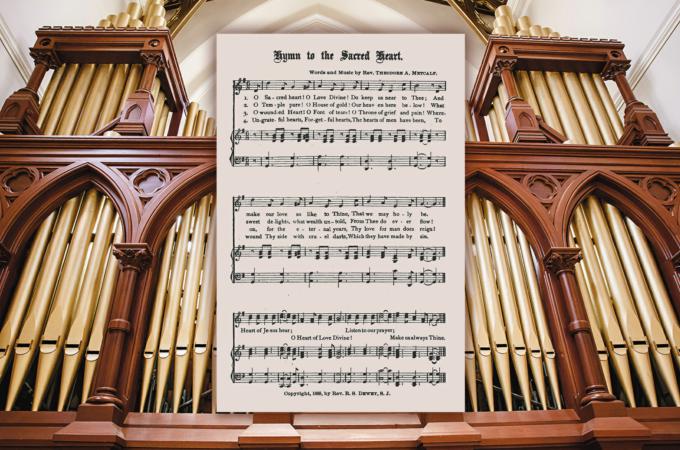The compositions of Father Theodore Metcalf
I want to start by thanking a regular reader of The Pilot for contacting me to suggest the following topic and sharing his research on Father Metcalf's contributions to Catholic music.
The Solemnity of the Sacred Heart fell on June 19, 2020, so the suggested topic is Father Theodore A. Metcalf, a Boston priest whose composition of the "Hymn to the Sacred Heart," better recognized by its opening lines "O Sacred Heart! O Love Divine!" saw widespread use prior to reforms instituted by the Second Vatican Council.
As a young man, Metcalf was raised a Protestant. However, his grandfather, Judge Theron Metcalf of the Massachusetts Supreme Judicial Court, encouraged him and several other family members to convert to the Catholic faith; Judge Metcalf never converted himself. Records from the Cathedral of the Holy Cross in Boston reveal that Theodore Metcalf was baptized by Bishop John Bernard Fitzpatrick on March 24, 1858.
Though little is known about his life during the intervening years, an entry in the bishops' journal dated July 10, 1863, shows that Metcalf tried to have the Sisters of Charity assume control of the Boston City Hospital. The venture proved unsuccessful as the Sisters were active nursing Civil War soldiers and could not provide the numbers needed lest they remove them from military hospitals.
Three months later, on Oct. 13, 1863, Metcalf entered the North American College in Rome and was ordained on May 22, 1869. Having distinguished himself as a seminarian, he was selected to serve as one of only two American secretaries at the First Vatican Council, which began in December 1869, and later the following year began his short tenure as vice-rector at his alma mater.
In 1872, Father Metcalf returned to Boston and was assigned to the Cathedral of the Holy Cross, where he would remain until 1879; from 1875 serving as chancellor of the now Archdiocese of Boston. Recognized as a gifted speaker by his contemporaries, at both the cathedral and later at Gate of Heaven Parish, it is said Catholics from throughout Boston would come to hear his sermons.
In 1880, Father Metcalf took leave. The following year he was in residence at Boston College and there is some evidence to suggest he took this time to compose a hymn performed by the college choir, later translated and reprinted in Latin. In 1882, he was given another parish assignment, Our Lady, Star of the Sea in Marblehead, where he remained through 1886. Little is known about his time there, other than that he formed the Young Men's Catholic Temperance Society, oversaw construction of a parish hall, and was described as "a scholarly, accomplished gentleman, who entered zealously upon his work and succeeded in endearing himself, not only to the parish but to the townspeople as well."
Father Metcalf's next assignment was at Gate of Heaven Parish in South Boston, starting in 1887. Although his tenure would amount to only three years, it would prove a significant part of his legacy. He started the parish branch of the Sacred Heart League, "one of the first and the most flourishing the diocese of Boston," and is believed to have composed several hymns to the Sacred Heart, including the aforementioned "O Sacred Heart! O Love Divine!" which first appeared in print in 1888. It would continue to appear in hymnals throughout the 20th century, through at least 1968, where it was included in an edition of "The Catholic Chapel Hymnal."
Another composition written for the Sacred Heart League at Gate of Heaven, "Form Your Ranks, Oh, Ye Leaguers," was also included in several compilations of hymnals, including "St. Basil's Hymnal" and the "Crown Hymnal." Regretfully, it is believed many print editions that included his work did not explicitly credit him with the compositions, so the full extent of his contributions is not known.
Father Metcalf is also known for having successfully protested against anti-Catholic teachings to the Boston School Committee by a letter written May 8, 1888. Briefly, a history teacher instructed students that an indulgence meant Catholics were free to commit any sin, even murder, and would be forgiven if they paid enough money to the Church. It was found that the textbook in use supported this view, and contained other misinterpretations of Catholic teachings, and was removed from use. It was recognized that the teacher was following the text, but nonetheless he was publicly censured and reassigned to teach English.
Father Metcalf, "one of the foremost members of the diocesan clergy in the time of Archbishop Williams," was forced to resign from Gate of Heaven in 1890 due to health problems. This may also explain why he subsequently moved to Washington, D.C., perhaps hoping a warmer climate would provide relief. There is one mention of him co-founding a boys' choir school in that city.
Father Metcalf did return to Boston, where he died on July 29, 1920. His funeral was held the following day at St. Raphael Church in Medford, and he is interred at Holyhood Cemetery in Brookline.
- Father Thomas Ryan, CSP, directs the Paulist North American Office for Ecumenical and Interfaith Relations in Boston.



















